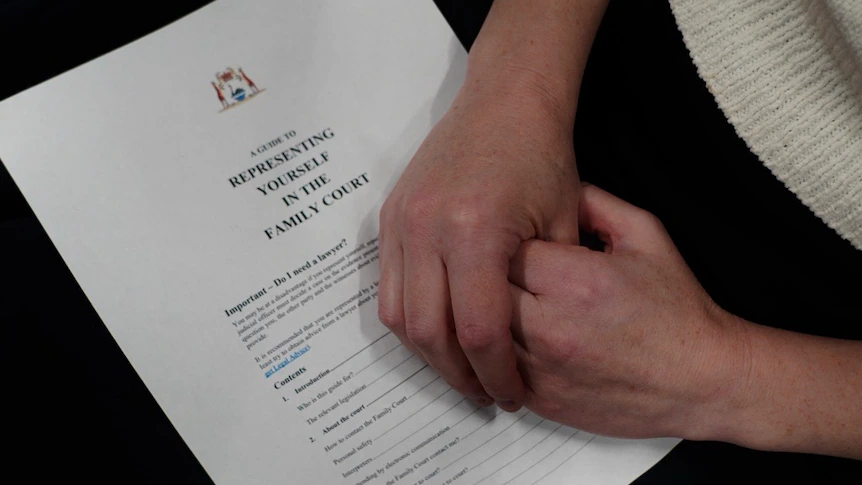By Isabella Ross
Copyright abc

Jacinta says she is part of a “big wave” of litigants self-representing in Family Court of Australia proceedings after feeling “financially exploited” by family law firms.
When she left a domestically violent partner, who is the father of her children, Jacinta found herself forced into a litigious battle.
Jacinta, whose name as been changed for legal reasons, had been in contact with family violence services.
She was not eligible for Legal Aid representation.
In Jacinta’s experience, she could not access timely legal advice from various community legal centres as well, because “they were completely overwhelmed”.
Despite the vast majority of Family Court litigants facing legal fees between tens of thousands to $100,000 plus, only 8 per cent of Australian households can access family law legal representation grants of aid.
This is despite 13 per cent of Australians living below the poverty line, leaving the ‘missing middle’ in a financially precarious predicament.
Jacinta went on to consult multiple firms but felt as though the majority “leveraged the system to bill you every second of their time”.
Despite opting to be a self-represented litigant for financial reasons, Jacinta’s legal fees were “in the thousands”.
This came down to factors like consulting with lawyers throughout her self-representation process and family report writer costs.
“The law firms give you very little attention because you’re not a full client of theirs,” she said.
“You need to know case law and be very alert. You’re wearing all the hats.
“Trying to navigate the court system is just incredibly crushing.”
She said the firm representing her ex-partner was also unfairly gathering evidence against her, creating additional expense and anxiety.
“It’s exhausting. You have to stay one step ahead of their manipulative tactics.”
Mother ‘terrified’ of being a self-represented litigant
Charlotte, whose name has also been changed for legal reasons, is at risk of having no choice but to self-represent, pending her application for Legal Aid representation.
She previously used a privately funded lawyer, but her available funds are dwindling, tens of thousands of dollars later.
“I have a friend who self-represented successfully, but she said she would never wish the experience on anybody as it was the most exhausting and traumatising part of it,” she said.
Charlotte is determined to continue fighting for her children’s best interests, after she too experienced domestic violence.
She said it was a serious incident that prompted her to leave her ex-partner.
“It’s given me a fire in my belly for justice. Once this is all over I want to help other women in a similar situation,” she said.
“If you can stay out of the Family Court — stay out. Once upon a time my ex and I loved each other enough to make these beautiful kids — they should be our priority.”
Family Court ‘too adversarial’
Joe Rose is a Sydney-based solicitor who specialises in legal costs disputes across various jurisdictions, including family law.
“The side of our business that handles disputes between solicitors and their own clients — there’s a disproportionate number of family law matters within that,” he said.
“I think the biggest reason is a failure from the law firm’s side to give a proper estimate at the outset. Things change in these matters, but a lot of the time the law firm fails to update that estimate.”
Mr Rose said he had one client tell him they felt as though the system was “completely broken”.
“I think the Family Court is far too adversarial, generally speaking. My advice to anyone in any litigation, but family law in particular, is to try to take as conciliatory tone as possible to avoid going further down the legal road.”
A spokesperson for the Federal Circuit and Family Court of Australia said court data suggested that in 76 per cent of family law matters finalised in 2024-25, both parties had legal representation at some point in their proceedings.
“It is acknowledged that some parties involved in family law disputes are not legally represented throughout the course of their proceedings, or they may only be represented for part of it,” the spokesperson said.
They pointed to the “processes and initiatives that improve access to justice and provide support to unrepresented litigants”.
This includes video resources, plain language guides, translated materials, triage counsellors and more.
“Other initiatives have been more recently introduced to improve safety, access, equity, and inclusion to support all litigants, but particularly those who may be unrepresented or facing challenges when navigating the court process.”
Parents ‘driven mad by contradictions’ of system
Marianne Hester, an emeritus professor and leading researcher of gender-based violence in the UK, devised the ‘three-planet model’.
The model outlines how the system dealing with support services for victim-survivors, the system overseeing child protection, and lastly, the Family Court system each have different priorities and often work in contradiction to one another.
Professor Hester said the model reflected a universal experience many victim-survivors faced.
“A psychiatrist once told me that he was seeing women who had literally been driven mad by the contradictions inherent across the three systems/planets.
“[The model] helped explain why they [victim-survivors] were constantly feeling that the Family Court system in particular was gaslighting them, enabling the abusive partner,” she said.
Professor Hester said many victim-survivors in Family Court proceedings had experienced “trying to stop or contain the impact on the children while the abusive partner was continuously using the courts to push for more and more contact”.
She noted how this enabled the ex-partner to “use ‘battery by the law’ and to bankrupt the victim-survivors” in proceedings.
For Jacinta, she said researching the three-planets model and speaking to fellow self-representing parents helped her feel empowered.
She is waiting to see if recent legislative changes in family law — such as mandating the court to consider the economic impact of family violence in property settlements — will make a tangible difference.
She hopes the Family Court further acknowledges the sheer number of self-represented litigants.
“It consumes your entire life. The amount of parents I have seen self-representing is shocking.
“We are already at a disadvantage, so adjusting the power imbalance is crucial,” Jacinta said.
“Every profession needs to have accountability — even the family law system.”



